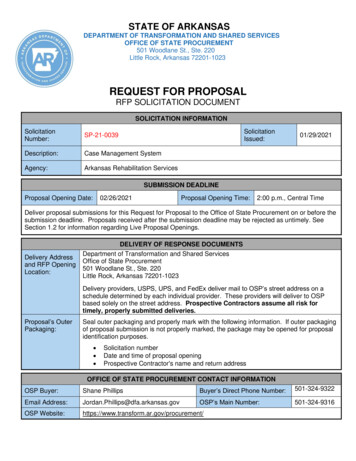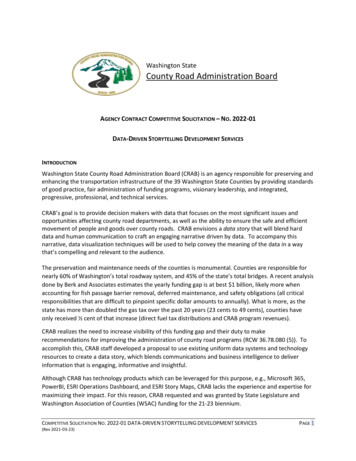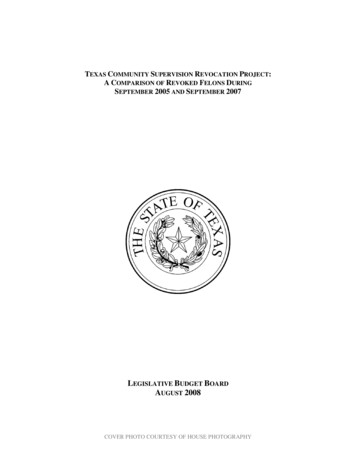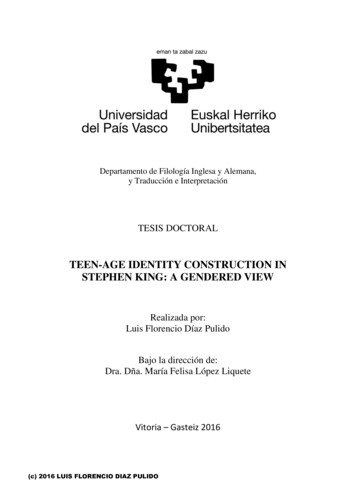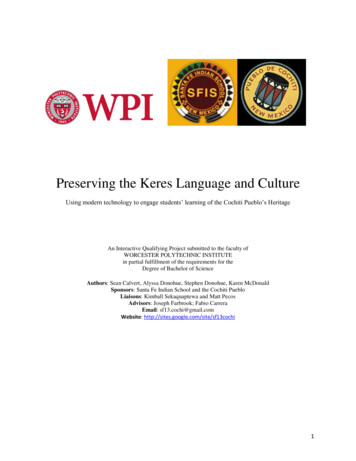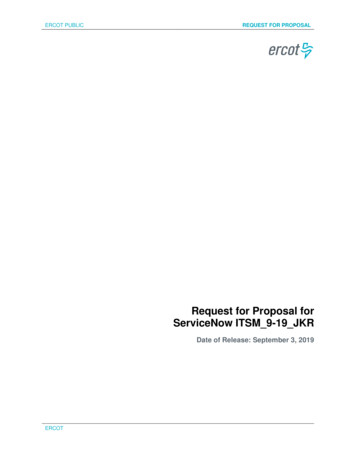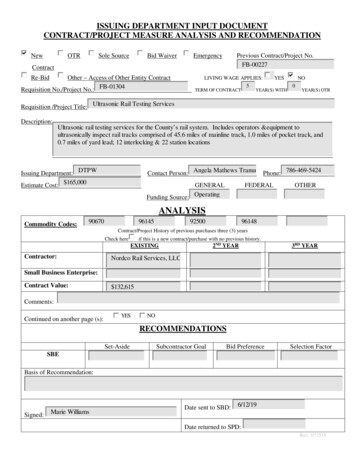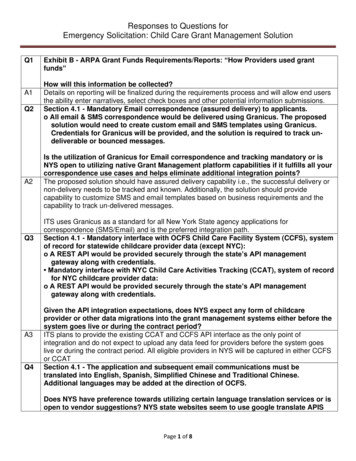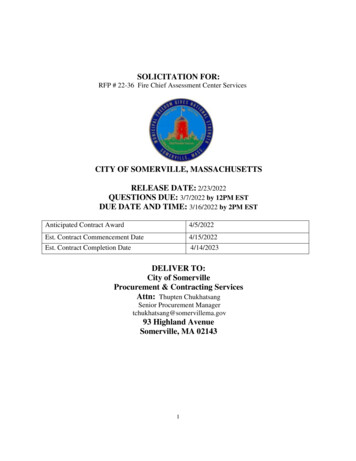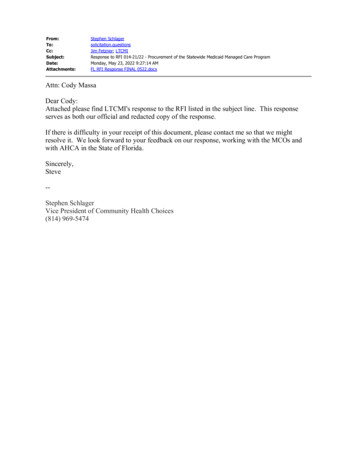
Transcription
From:To:Cc:Subject:Date:Attachments:Stephen Schlagersolicitation.questionsJim Fetzner; LTCMIResponse to RFI 014-21/22 - Procurement of the Statewide Medicaid Managed Care ProgramMonday, May 23, 2022 9:27:14 AMFL RFI Response FINAL 0522.docxAttn: Cody MassaDear Cody:Attached please find LTCMI's response to the RFI listed in the subject line. This responseserves as both our official and redacted copy of the response.If there is difficulty in your receipt of this document, please contact me so that we mightresolve it. We look forward to your feedback on our response, working with the MCOs andwith AHCA in the State of Florida.Sincerely,Steve-Stephen SchlagerVice President of Community Health Choices(814) 969-5474
REQUEST FOR INFORMATION RFI 014-21/22State of FloridaAgency for Health Care AdministrationRe-procurement of the Statewide Medicaid Managed Care ProgramRFI ReleaseRESPONDENTName:Address:Long Term Care & Medicaid Innovations (LTCMI)5 West 10th Street, Suite 300Erie, Pennsylvania 16501Website:https://ltcmi.comContact name:Contact number:Contact e-mail:James Fetzner, CEO(814) 864-1323JFetzner@LTCMI.comLong Term Care & Medicaid Innovations (LTCMI) is a portfolio of companies focused on, andexperienced in, creating substantive improvement in housing and services for those with limitedaccess due to condition or circumstance. LTCMI’s motivation is to promotedeinstitutionalization of low income seniors and adults with disabilities through superiorideation, development, implementation, and operations.With over 20 years of experience LTCMI’sportfolio has successfully developed andimplemented its shared housing model and homecare solutions in multiple states. LTCMI’sshared housing solution, which increases accessand affordability to fully integrated communitybased housing leverages local capital, resources,and stakeholders in to order create housingoptions where none currently exist.LTCMI’s service and housing solutions aresupported by a proprietary technology platformwhich monitors care delivery, staffinteraction/workflow and provides electronicvisit verification (EVV) in conjunction withbilling and claims systems.1 P a g e
REQUEST FOR INFORMATION RFI 014-21/22State of FloridaAgency for Health Care AdministrationRe-procurement of the Statewide Medicaid Managed Care ProgramRFI ReleaseOur success in developing, implementing, andoperating these enterprises positions LTCMI toprovide a unique perspective in assisting managedcare plans and government agencies to defineunderlying housing and service gaps and, moreimportantly, help solve these issues throughapplication of a coordinated process ofcommunity and organizational initiatives.RESPONSEIn preparation for the upcoming Statewide Medicaid Managed Care Program Re-procurement,the Florida Agency for Health Care Administration, through this RFI (REQUEST FORINFORMATION RFI 014-21/22) has solicited information from organizations with vast experience,such as LTCMI, to identify new models and/or innovations in delivery of services to Medicaidmanaged care beneficiaries.LTCMI, with its vast experience in developing, implementing, operating, and consulting in areasof housing, home care service provision, and technological support, is compelled to contribute itsthoughts and efforts to the State of Florida and contracted managed care organizations in orderto: “Enhance specialty health plans services to improve outcomes for recipients to addresstarget populations with specific health conditions or needs”; and “Maximize home and community-based placement and services through proactive agingin-place strategies, metrics and outcomes in alignment with Florida’s State HealthImprovement Plan,” specificallyo “Strategy HE3.4 to promote fiscal, environmental and policy approaches thatincrease affordable housing, improve neighborhood safety and access to healthyfoods, and encourage community design and development that enhances access toand availability of physical activity opportunities to improve health outcomes.”Source: AHCA RFI 014-21/22, Page 3 of 8)CHALLENGEIn order to understand how to enhance service provision, improve outcomes and access withappropriate fiscal stewardship, there is a need to address one of the major issues facing Florida: alack of community-based housing options/capacity.Prior to the pandemic, there was a significant shift toward avoidance of traditional andinstitutional housing. The reasons for this were varied. However, the pandemic served toexacerbate and solidify this trend with the further complication that institutions are now facingimmediate difficulties with occupancy levels.2 P a g e
REQUEST FOR INFORMATION RFI 014-21/22State of FloridaAgency for Health Care AdministrationRe-procurement of the Statewide Medicaid Managed Care ProgramRFI ReleaseThe crisis now facing states, Florida in particular, is that occupancy percentages in nursinghomes have drastically decreased. National occupancy rates are hovering between 70 and 80percent, among the lowest ever measured. In a recent survey of 460 nursing homes, 72 percent ofthe facilities said they would be unable to sustainoperations at current levels for 12 months and 40percent responded that they would be unlikely tosurvive for six months.This is similar to what is being seen in otherinstitutional settings as well. Assisted livingfacilities have also experienced double-digitWith Current Operating Costs, 40% of Nursing Homes Could Shut Down in Six Months or Less Skilled Nursing Newspercentage decreases in occupancy rates.This decrease in occupancy levels has shifted demand from institutionalized care to thecommunity. In turn, this has created vast increased demand volume for community-basedservices to provide care. While that shift if rife with challenges such as staffing and coordination,by far the biggest issue is that in order for beneficiaries and members to obtain home andcommunity-based services (HCBS), they must have a suitable home.Even if housing can be identified, there is often a requirement for modifications to allow formobility impairment. In many cases, even without the expense of modifications, affordability forthose with low or limited income is suspect, and as a result housing access becomes an almostimpenetrable barrier to HCBS.This barrier is evidenced in a housing gap, which is the differential between the percentage oflow-income renters in need of support and those who are actually able to access it through thevarious subsidy programs. That variance has been estimated at a shocking 79% (The Gap National LowIncome Housing Coalition (nlihc.org), creatingextraordinarily long wait lists.The gulf becomes deeper for those tryingto access housing when there areadditional barriers such as income andThe U.S. Has National Shortage of More Than 7.2 Million Affordable & Available Rental Homes forADL (activities of daily living)Families Most in Need National Low Income Housing Coalition (nlihc.org)impairment. Less than one percent ofavailable units are suitable for those who are wheelchair bound -housing-wheel-chair-accessible).While no state seems to have an adequate solution to this crisis, several states seem to have agreater dearth of available housing for low-income individuals. Florida is one of the seven stateswith the least amount of access to housing for those with low income.3 P a g e
REQUEST FOR INFORMATION RFI 014-21/22State of FloridaAgency for Health Care AdministrationRe-procurement of the Statewide Medicaid Managed Care ProgramRFI ReleaseAccording to the National Low Income Housing Coalition, Florida has less than 30 affordableand available rental homes per 100 low income households.SOURCE: NLIHC: The Gap National Low Income Housing Coalition (nlihc.org)SOLUTIONLTCMI’s solution to this crisis is to maximize home and community-based placement and servicesthrough the application of its shared housing and services model. This shared housing modelconsists of co-locating unrelated individuals together in a private residence. In addition todramatically reducing costs and increasing the inventory of available housing to low incomeconsumers, this model also improves quality of life and access to care services. The structurealso facilitates increased connectedness among participants, who come to feel more like familythan roommates in a dynamic that has come to be called a “cooperative family.”4 P a g e
REQUEST FOR INFORMATION RFI 014-21/22State of FloridaAgency for Health Care AdministrationRe-procurement of the Statewide Medicaid Managed Care ProgramRFI ReleaseLTCMI would propose the development of a statewide capacity building initiative aimed ateducating and empowering various stakeholders to develop and deploy alternative housingmodels to address the housing gap.This solution is executed over several phases with a focus on increasing the knowledge, skillsand abilities of staff and resources in the community, the MCOs, and the departmental staff. Thephases of this solution implementation incorporate Landscape Review and Capacity Buildingthrough stakeholder development and support.Phase I - Landscape ReviewThe LTCMI landscape review launches with a population analysis which utilizesanalytics to determine the demographics, inventories and housing capacities of specificgeographies. This review will look to define the population through typical demographicfactors such as age and income level. These statistics will be layered with additionalevaluations around morbidity/functionality levels, HCBS utilization, and surveys aroundtransition patterns between levels of care as well as service locations.Simultaneously, this review incorporates investigation of housing within thesegeographies. Specifically, it will look to identifyqualified residential inventories, utilization andeffectiveness of subsidy and voucher programs aswell as a general analysis of zoning andregulatory issues.This data will dovetail with the appraisal ofinstitutional capacities and their level of availableservice and volume.Phase II – Capacity BuildingThe final stage of the LTCMI solution is intensive education and training of allstakeholders, leveraging all of the resources garnered in Phase I of the program, in orderto create actual housing access and capacity to provide HCBS. These stakeholders’engagements will incorporate the staff noted in Phase I, as well as the real estatecommunity, CBOs (community-based organizations), health care providers, and LTSSproviders.This phase will result in a legion of engaged stakeholders able to source housing, modifyunits, understand needs, barriers, solutions and, in the end create increased capacity.5 P a g e
REQUEST FOR INFORMATION RFI 014-21/22State of FloridaAgency for Health Care AdministrationRe-procurement of the Statewide Medicaid Managed Care ProgramRFI ReleaseThese stakeholders will be able to work both independently and in concert to developaccess concurrently, allowing for exponential growth.IMPACTThe impact of LTCMI projects demonstrate incredible mental health, physical well-being, andgeneral health outcomes. The model is premised on a shared residence fully integrated within aneighborhood setting.The construct can be augmented with the staffing andtechnological solutions espoused and perfected by LTCMI tocreate a fully interoperable housing solution which will allowfor cross-trained redundant coverage systems, acutemanagement, and oversight as well as a cloud-based system totrack patient care and ensure EVV claims match.While the operational model is worth touting and will lessenpotential stresses on the system, the true impact of the LTCMI model is felt in its ability toincrease access and improve clinical outcomes. One of the most significant indicators of aconsumer’s well-being in a particular setting is the rate of transition, especially hospitalizationrates and emergency department (ED) utilization. The LTCMI design and approach promotes astability which cannot be replicated in traditional settings.Data shows that residents served through the LTCMI model are significantly (300-500%) lesslikely to experience unnecessary admissions and ED visits.On the surface this is a positive influence on the system as it reduces costs and more effectivelyutilizes resources. However, it also is a strong indicator that the design and care delivered underthis model is superior and allows for less acute clinical episodes.Similar impacts can be seen in analyses of quality indicators such as falls leading to major injuryand clients experiencing major weight loss. The settings promoted and created in this modellessen these risks to negligible rates.6 P a g e
REQUEST FOR INFORMATION RFI 014-21/22State of FloridaAgency for Health Care AdministrationRe-procurement of the Statewide Medicaid Managed Care ProgramRFI ReleaseQuality of life standards are also influenced by the LTCMI housing and home care design.Through the efforts to integrate staff and clients with each other, and as the solution is residentialbased, the opportunity to interact increase significantly, which in turn creates incredible uptick insocial interaction while reducing loneliness.The pandemic of the last several years dramatically demonstrated the negative impact ofinstitutional settings and the incredible benefit of community-based solutions as espoused underthis program. Florida data indicated that more than 40 percent of nursing home residents, morethan 30,000 people, contracted COVID and more than 16 percent of those residents died.⁓⁓⁓41 percent of NH admissionscontracted COVID30,541 COVID cases associated with NHand PC homes16 percent of those contracting COVIDdiedCOVID-19 Nursing Home Resident and Staff Deaths: AARP Nursing Home DashboardIn contrast, the clients served by the LTCMI model, experienced far superior outcomesthroughout the entire pandemic. The infection rate for clients served by the model was less than2½ percent and the mortality rate was infinitesimal.7 P a g e
REQUEST FOR INFORMATION RFI 014-21/22State of FloridaAgency for Health Care AdministrationRe-procurement of the Statewide Medicaid Managed Care ProgramRFI ReleaseCONCLUSIONThe impact analysis above indicates that, where the LTCMI model was in service during thepandemic, lives were saved, especially for target populations such as those with limited incomesand ADL limitations. It further shows that the implementation of this model significantly andproactively increases affordable housing, safety, and access to food while encouragingcommunity development, which aligns directly with one of the strategies of the State HealthImprovement Plan.LTCMI would be honored to have the opportunity to present their program and services toagency leadership or any organization who would like to partner in improving HCBS capacity,efficiency, and member outcomes.8 P a g e
From: Stephen Schlager To: solicitation.questions Cc: Jim Fetzner; LTCMI Subject: Response to RFI 014-21/22 - Procurement of the Statewide Medicaid Managed Care Program Date: Monday, May 23, 2022 9:27:14 AM Attachments: FL RFI Response FINAL 0522.docx Attn: Cody Massa Dear Cody: Attached please find LTCMI's response to the RFI listed in the subject line. This response
